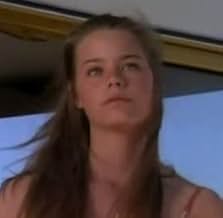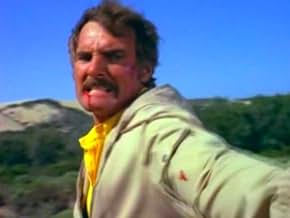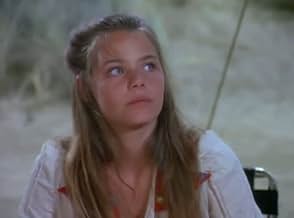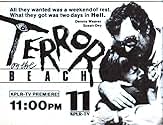IMDb RATING
5.3/10
380
YOUR RATING
A family's outing turns out badly as they are terrorized by a gang of young thugs.A family's outing turns out badly as they are terrorized by a gang of young thugs.A family's outing turns out badly as they are terrorized by a gang of young thugs.
Jacqueline Giroux
- Mickey
- (as Jackie Giroux)
Carole White
- Helen
- (as Carol Ita White)
- Director
- Writer
- All cast & crew
- Production, box office & more at IMDbPro
Featured reviews
Another reactionary film that warns America: there's a Manson family in your neighbourhood! And they want to terrify you with their dune buggies and long hair! This Manson family, however, doesn't seem to do much other than drive around being mean to people. No sex, no drugs, and not much rock n roll are in evidence. They also shave. In other words, typical movie of the week stuff with a ridiculous ending.
TV-made melodrama appears to be a smaller-scaled variation of "Straw Dogs", yet also tends to resemble the cheesier "Hot Rods to Hell". Dysfunctional family--older dad and mom, accompanied by their two college-age kids--take a camping trip to the beach but run afoul of sadistic hooligan teenagers (dressed in hippie garb reminiscent of the Manson followers). Dennis Weaver's complacent father learns to fight back after his family's safety is threatened, but why are these delinquents so obsessed with terrorizing the straight-laced clan? And why do they always seem two-steps ahead of not only Weaver but also the beach patrol? Writer Bill Svanoe's negligence in explaining the situation at hand doesn't seem unintentional at all; he appears to harbor a fear of hippies/irrational kids in general, no doubt propelled by the headlines of the day. His teleplay bulldozes straight on to a rather predictable showdown, one that indicates to us that the family who fights together stays together. Nevertheless, it's an engrossing scenario, helped immeasurably by several good (if occasionally overwrought) performances.
Hippie band menaces suburban family camping at the beach.
A made for TV quickie— it's not even hard to spot the commercial pauses. Probably took them no more than 5 days to shoot. One thing for sure-- they didn't have to build any sets. No sir, no phony surf or projection screens here; it's all genuine SoCal coastline.
However, the storyline is something else, more like a respectable person's bad dream about stereotyped hippies. So why does the Manson-like band harass good citizen Weaver and his family. Unless I missed something, we're never told, which sort of blows a hole through the middle of the plot. I guess we're to assume it's a culture clash with hippies as the inexplicable bad guys. My guess is the script was a rush job without time to plug the holes.
In fact, just what the band is trying to do remains murky throughout. They taunt and leer, drive recklessly, trash the campsite, and even tip over the camper. But who knows why—just hippie fun, I guess. Meanwhile, citizen Weaver finally goes from suburban Milktoast to enraged righteousness, and we wonder what took him so long. I'm sensing a parable here that sort of fits in with the Charles Bronson vigilante movies of the time-- Death Wish (1974)-- where low-life's rape and murder Bronson's family triggering his own murderous rage. But of course, that's much too brutal for a TV movie. So we get low-life vandals, instead.
Anyway, the narrative manages some tension as the provocations mount; the acting is good; and I almost got a sunburn from watching. Then too, the bickering father-son, mother- daughter, amount to a realistic touch. But unless you want a time-passer or just don't like hippies, skip it.
A made for TV quickie— it's not even hard to spot the commercial pauses. Probably took them no more than 5 days to shoot. One thing for sure-- they didn't have to build any sets. No sir, no phony surf or projection screens here; it's all genuine SoCal coastline.
However, the storyline is something else, more like a respectable person's bad dream about stereotyped hippies. So why does the Manson-like band harass good citizen Weaver and his family. Unless I missed something, we're never told, which sort of blows a hole through the middle of the plot. I guess we're to assume it's a culture clash with hippies as the inexplicable bad guys. My guess is the script was a rush job without time to plug the holes.
In fact, just what the band is trying to do remains murky throughout. They taunt and leer, drive recklessly, trash the campsite, and even tip over the camper. But who knows why—just hippie fun, I guess. Meanwhile, citizen Weaver finally goes from suburban Milktoast to enraged righteousness, and we wonder what took him so long. I'm sensing a parable here that sort of fits in with the Charles Bronson vigilante movies of the time-- Death Wish (1974)-- where low-life's rape and murder Bronson's family triggering his own murderous rage. But of course, that's much too brutal for a TV movie. So we get low-life vandals, instead.
Anyway, the narrative manages some tension as the provocations mount; the acting is good; and I almost got a sunburn from watching. Then too, the bickering father-son, mother- daughter, amount to a realistic touch. But unless you want a time-passer or just don't like hippies, skip it.
Dennis Weaver has decided to take the family on camping/beach vacation on the Pacific coast. Some of the relationships are getting a little frayed and he thinks this might be a chance to mend. Especially with son Kristoffer Tabori who has announced that he is leaving college.
So it's Weaver, Tabori, and wife Estelle Parsons and daughter Susan Dey off in the camper. They run afoul of Scott Hyland and his gang of drugged out dune buggy buddies who proceed to terrorize the Glynn family on their vacation.
The theme is a familiar one, the civilized man who can't quite comprehend pure evil when confronted. Fortunately for Weaver he catches on in time to save himself and his family.
Besides the chase and action sequences the best ones are the scenes between father and son. Weaver and Tabori put some real bite into them.
Familiar theme, low budget, but nicely acted by the ensemble cast.
So it's Weaver, Tabori, and wife Estelle Parsons and daughter Susan Dey off in the camper. They run afoul of Scott Hyland and his gang of drugged out dune buggy buddies who proceed to terrorize the Glynn family on their vacation.
The theme is a familiar one, the civilized man who can't quite comprehend pure evil when confronted. Fortunately for Weaver he catches on in time to save himself and his family.
Besides the chase and action sequences the best ones are the scenes between father and son. Weaver and Tabori put some real bite into them.
Familiar theme, low budget, but nicely acted by the ensemble cast.
Neil and Arlene Glynn (Dennis Weaver and Estelle Parsons) and the kids, Deedee and Steve (Susan Dey and Kristoffer Tabori) are en route to the beach for a camping weekend.
Oh no!
A group of hellish hippies runs them off the road! It doesn't end there, as these hairy hellions are persistent. Neil is a bit of a milquetoast, wanting to just let it go, while his son seems to see trouble brewing. We also learn that the Glynn family is under some strain of their own. They're busy trying to come to grips with growing up / older.
Once at the beach, all seems well, but the hipsters are nearby! Soon, the true mayhem begins. How will the Glynns cope with this danger?
TERROR ON THE BEACH is a made-for-TV movie that plays on the fear of young, crazed, cult-types, in the wake of such things as the Manson Family murders. It tackles the generation gap as well, with the discourse between the parents and offspring representing what was happening then (1973).
As for the ne'er do wells, they're fairly intimidating, though their eeevil hijinks seem mostly sophomoric and absurd. Still, they have their moments. It's almost like watching a strange hybrid of THE HILLS HAVE EYES and any juvenile delinquent film from the 1950's-early 60's, with the addition of dune buggies!
A fun, silly romp through the sand...
Oh no!
A group of hellish hippies runs them off the road! It doesn't end there, as these hairy hellions are persistent. Neil is a bit of a milquetoast, wanting to just let it go, while his son seems to see trouble brewing. We also learn that the Glynn family is under some strain of their own. They're busy trying to come to grips with growing up / older.
Once at the beach, all seems well, but the hipsters are nearby! Soon, the true mayhem begins. How will the Glynns cope with this danger?
TERROR ON THE BEACH is a made-for-TV movie that plays on the fear of young, crazed, cult-types, in the wake of such things as the Manson Family murders. It tackles the generation gap as well, with the discourse between the parents and offspring representing what was happening then (1973).
As for the ne'er do wells, they're fairly intimidating, though their eeevil hijinks seem mostly sophomoric and absurd. Still, they have their moments. It's almost like watching a strange hybrid of THE HILLS HAVE EYES and any juvenile delinquent film from the 1950's-early 60's, with the addition of dune buggies!
A fun, silly romp through the sand...
Did you know
- GoofsThere is a clear change from exterior scenes shot on the beach to beach scenes shot in a studio. The lawn chairs on the beach are a light color. In the studio scenes, the lawn chairs are black.
- Quotes
Neil Glynn: Hey... are these trees? Hm?
Arlene Glynn: They are trees.
Neil Glynn: Hm-hm. You know, the last time we were by here, it seemed like they were smaller. You remember these trees, kids?
DeeDee Glynn: Oh, you don't forget trees like these, dad.
Steve Glynn: I think I remember them, dad.
Details
- Runtime
- 1h 14m(74 min)
- Color
- Aspect ratio
- 1.33 : 1
Contribute to this page
Suggest an edit or add missing content




























